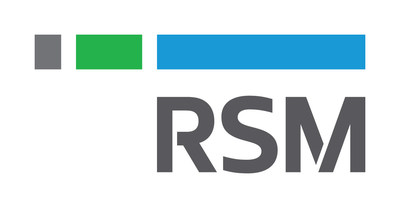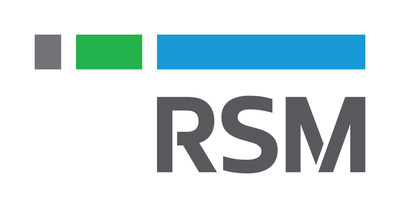Workforce special report examines impacts of evolving work dynamics on employers, employees and physical workplaces in the middle market
CHICAGO, Jan. 30, 2023 /PRNewswire/ — Three years after the start of the pandemic, remote work is becoming a permanent fixture among American middle market businesses, according to the RSM US Middle Market Business Index (MMBI) Workforce Special Report, released today by RSM US LLP (“RSM”) in partnership with the U.S. Chamber of Commerce. The report shares findings from a special set of questions about the workplace and hiring that were included in RSM’s quarterly MMBI survey, and the results reflect a dramatic shift in the way midsize businesses operate, affecting everything from operations to recruitment and culture.
In the fourth quarter of 2022, 33% of middle market executives reported having employees working remotely as a result of COVID-19 who were not doing so before the pandemic. This figure is only slightly below the 36% who responded similarly to the same question a year earlier, when COVID-19 infections were higher. Of those businesses that have employees working remotely, nearly three quarters (74%) allow for hybrid work, while more than half (54%) provide an option to work off site all the time.
“American workers experienced profound shocks during the pandemic, and that altered their preferences and behavior,” said Joe Brusuelas, chief economist with RSM US LLP. “As a result, firms are choosing to accommodate employees in order to retain their workers and recruit new ones. It’s clear that if middle market firms want to remain competitive, they will have to make concessions and adjustments that only five years ago would have been hard to imagine.”
Firms Adapting to Remote Work Opportunities and Challenges Amid Competitive Labor Market
In a tight labor market with job openings near all-time highs, employers are having to accommodate workers’ demands for flexibility, which the survey found has not been particularly damaging to firms. In fact, when asked about the impact that remote or hybrid work is having on their business’s culture, 39% of executives said that it had a positive impact. That view was especially pronounced among larger middle market firms ($50 million to $1 billion in annual revenue), with 55% of executives citing a positive outcome on the firm’s culture. Smaller firms ($10 million to $50 million in annual revenue), by contrast, have a dimmer view with only 28% reporting remote work had a positive impact on culture.
The survey also found that larger middle market companies have been able to better handle the transition to remote and hybrid work, from both a technological and human resources standpoint. In one example, nearly half (48%) of the respondents said they were hosting remote networking events or considering it. When segmented by firm size, this figure rose to 53% for larger companies and declined to 46% for smaller middle market businesses. Additionally, when asked if their companies have the technology and tools for online mentoring, 66% percent of larger firms said they did, compared to 41% of smaller middle market firms.
Remote work trends are evolving as hiring, even with the prospect of a possible recession, remains robust. Just more than half of the executives surveyed (51%) said their hiring needs over the next year would be significantly to moderately higher. While that figure has moderated compared to a year earlier, it remains high.
More than half (52%) of the survey respondents said they are sourcing talent for work that can be done remotely from a broader geographical area than before COVID-19. This is up from the 49% of executives who responded similarly to the same question a year earlier.
“In a labor market with millions of open jobs, we have seen middle market businesses ramping up incentives to attract and retain talent including flexibility in work hours, remote work options, education and training, childcare benefits, and more,” said Jenna Shrove, Senior Director of Strategic Advocacy and Advisor to the Chief Policy Officer at the U.S. Chamber of Commerce. “There are many innovative options businesses can consider to keep up with changing workforce patterns and remain competitive.”
The survey also revealed challenges that firms are facing as they adapt to changing workforce dynamics. More than two-thirds (69%) of middle market firms that currently have employees working outside the office said that remote and hybrid work had impeded employee training and development, up from 64% a year ago. Additionally, 66% of middle market firms that currently have employees working remotely said that remote work has created challenges for onboarding or orienting new employees.
Impact of Remote Work on Middle Market Employees
To gain the perspective of employees, RSM conducted an online survey in the fall of 2022 of more than 4,000 workers in the United States and Canada, split between middle market and large organizations. The survey—which is separate from the MMBI poll of senior executives—found that U.S. middle market employees are significantly more likely than those working at larger organizations to desire more flexibility to set their own hours and schedule (62% vs. 56%).
“A candidate’s decision to work at a firm is about much more than just money. Pay and equity are important, of course, but so are having a good mentor, fulfilling career goals, and having the flexibility to maintain a balance with life outside of work,” said Anne Bushman, partner and head of the Washington national tax compensation and benefits group at RSM US. “Employees care a lot about flexibility, and firms should consider how they communicate its value as part of the compensation package.”
In the MMBI survey, when asked if remote work has had a negative impact on their employees’ mental health, 64% of executives said that it was anywhere from a minor to a major issue, up from 55% a year ago. The impact was more pronounced in the smaller end of the middle market, with 65% now reporting that mental health was an issue, compared to 42% a year ago.
A related challenge was a feeling of isolation among workers. Nearly three-quarters (73%) of middle market executives reported that workers were feeling isolated in the MMBI survey, up from 68% a year ago.
Firms Still Addressing How to Best Use Physical Workplaces
Just one quarter of middle market firms in the MMBI survey said they were planning to expand their physical footprint, either significantly or somewhat, over the next two years. Larger, more well-resourced companies at the upper end of the middle market took the lead, with 35% planning to increase their physical offices significantly or somewhat for employees, compared to just 17% of smaller middle market companies.
Smaller firms have become increasingly aware of the challenges of their physical space when accommodating their workers. When asked if their physical work location will pose challenges to staffing plans over the next year, 71% said they have some level of concern, compared to the 46% who gave a similar response a year earlier. For the middle market as a whole, the figure stood at 78%, up from 63% a year ago. In the larger end of the middle market, the challenge of physical space remains high, with 88% of firms citing some degree of challenge compared to 84% a year earlier.
The survey data that informs the RSM US Middle Market Business Index was gathered from 408 respondents between October 3 and October 21, 2022.
About the RSM US Middle Market Business Index
RSM US LLP and the U.S. Chamber of Commerce have partnered to present the RSM US Middle Market Business Index (MMBI). It is based on research of middle market firms conducted by Harris Poll, which began in the first quarter of 2015. The survey is conducted four times a year, in the first month of each quarter: January, April, July and October. The survey panel consists of approximately 1,500 middle market executives and is designed to accurately reflect conditions in the middle market.
Built in collaboration with Moody’s Analytics, the MMBI is borne out of the subset of questions in the survey that asks respondents to report the change in a variety of indicators. Respondents are asked a total of 20 questions patterned after those in other qualitative business surveys, such as those from the Institute of Supply Management and National Federation of Independent Businesses.
The 20 questions relate to changes in various measures of their business, such as revenues, profits, capital expenditures, hiring, employee compensation, prices paid, prices received and inventories. There are also questions that pertain to the economy and outlook, as well as to credit availability and borrowing. For 10 of the questions, respondents are asked to report the change from the previous quarter; for the other 10 they are asked to state the likely direction of these same indicators six months ahead.
The responses to each question are reported as diffusion indexes. The MMBI is a composite index computed as an equal weighted sum of the diffusion indexes for 10 survey questions plus 100 to keep the MMBI from becoming negative. A reading above 100 for the MMBI indicates that the middle market is generally expanding; below 100 indicates that it is generally contracting. The distance from 100 is indicative of the strength of the expansion or contraction.
About The U.S. Chamber of Commerce
The U.S. Chamber of Commerce is the world’s largest business organization representing companies of all sizes across every sector of the economy. Members range from the small businesses and local chambers of commerce that line the Main Streets of America to leading industry associations and large corporations.
They all share one thing: They count on the U.S. Chamber to be their voice in Washington, across the country, and around the world. For more than 100 years, we have advocated for pro-business policies that help businesses create jobs and grow our economy.
About RSM US LLP
RSM is the leading provider of professional services to the middle market. The clients we serve are the engine of global commerce and economic growth, and we are focused on developing leading professionals and services to meet their evolving needs in today’s ever-changing business landscape. Our purpose is to instill confidence in a world of change, empowering our clients and people to realize their full potential.
RSM US LLP is the U.S. member of RSM International, a global network of independent assurance, tax and consulting firms with 57,000 people across 120 countries. For more information, visit rsmus.com, like us on Facebook, follow us on Twitter and/or connect with us on LinkedIn.
![]() View original content to download multimedia:https://www.prnewswire.com/news-releases/rsm-survey-reveals-pandemic-driven-work-changes-are-becoming-permanent-as-competition-for-talent-continues-301733541.html
View original content to download multimedia:https://www.prnewswire.com/news-releases/rsm-survey-reveals-pandemic-driven-work-changes-are-becoming-permanent-as-competition-for-talent-continues-301733541.html
SOURCE RSM US LLP


